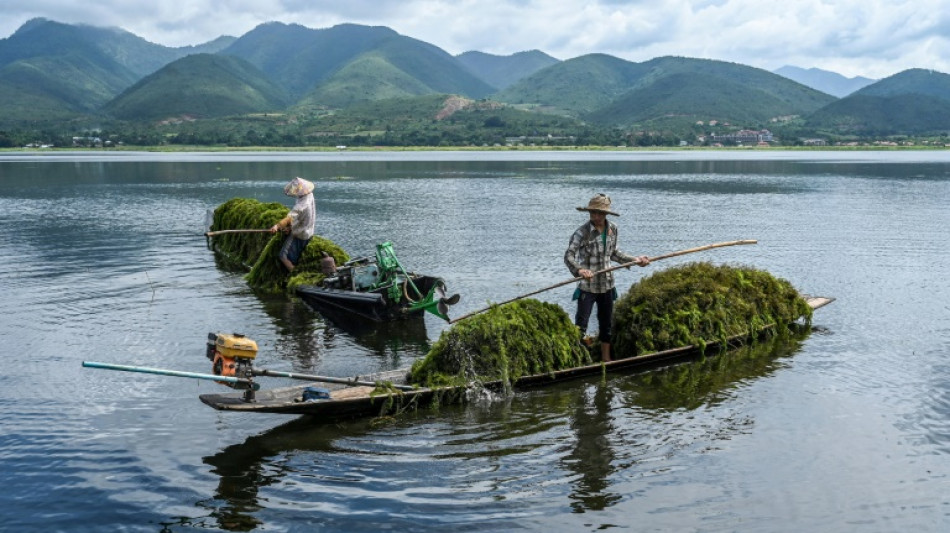
-
 Freeski star Gu says injuries hit confidence as she targets Olympic treble
Freeski star Gu says injuries hit confidence as she targets Olympic treble
-
UK police search properties in Mandelson probe

-
 Bompastor extends contract as Chelsea Women's boss despite slump
Bompastor extends contract as Chelsea Women's boss despite slump
-
Milan-Cortina Winter Olympics open with glittering ceremony

-
 A French yoga teacher's 'hell' in a Venezuelan jail
A French yoga teacher's 'hell' in a Venezuelan jail
-
England's Underhill taking nothing for granted against Wales

-
 Fans cheer for absent Ronaldo as Saudi row deepens
Fans cheer for absent Ronaldo as Saudi row deepens
-
Violence-ridden Haiti in limbo as transitional council wraps up
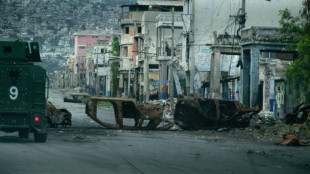
-
 Hundreds protest in Milan ahead of Winter Olympics
Hundreds protest in Milan ahead of Winter Olympics
-
Suspect in murder of Colombian footballer Escobar killed in Mexico

-
 Colombia's Rodriguez signs with MLS Minnesota United
Colombia's Rodriguez signs with MLS Minnesota United
-
Wainwright says England game still 'huge occasion' despite Welsh woes

-
 WADA shrugs off USA withholding dues
WADA shrugs off USA withholding dues
-
France detects Russia-linked Epstein smear attempt against Macron

-
 Winter Olympics to open with star-studded ceremony
Winter Olympics to open with star-studded ceremony
-
Trump posts, then deletes, racist clip of Obamas as monkeys

-
 Danone expands recall of infant formula batches in Europe
Danone expands recall of infant formula batches in Europe
-
Trump deletes racist video post of Obamas as monkeys

-
 Colombia's Rodriguez signs with MLS side Minnesota United
Colombia's Rodriguez signs with MLS side Minnesota United
-
UK police probing Mandelson after Epstein revelations search properties

-
 Russian drone hits Ukrainian animal shelter
Russian drone hits Ukrainian animal shelter
-
US says new nuclear deal should include China, accuses Beijing of secret tests
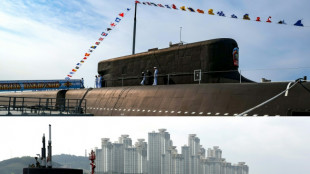
-
 French cycling hope Seixas dreaming of Tour de France debut
French cycling hope Seixas dreaming of Tour de France debut
-
France detects Russia-linked Epstein smear attempt against Macron: govt source

-
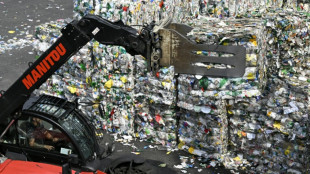 EU nations back chemical recycling for plastic bottles
EU nations back chemical recycling for plastic bottles
-
Terror at Friday prayers: witnesses describe blast rocking Islamabad mosque

-
 Iran expects more US talks after 'positive atmosphere' in Oman
Iran expects more US talks after 'positive atmosphere' in Oman
-
US says 'key participant' in 2012 attack on Benghazi mission arrested
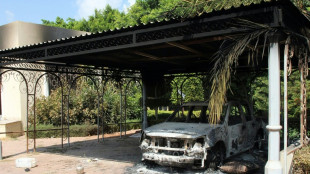
-
 Why bitcoin is losing its luster after stratospheric rise
Why bitcoin is losing its luster after stratospheric rise
-
Arteta apologises to Rosenior after disrespect row

-
 Terror at Friday prayers: witness describes 'extremely powerful' blast in Islamabad
Terror at Friday prayers: witness describes 'extremely powerful' blast in Islamabad
-
Winter Olympics men's downhill: Three things to watch

-
 Ice dancers Chock and Bates shine as US lead Japan in team event
Ice dancers Chock and Bates shine as US lead Japan in team event
-
Stellantis takes massive hit on 'overestimation' of EV demand

-
 Stocks rebound though tech stocks still suffer
Stocks rebound though tech stocks still suffer
-
Spanish PM urges caution as fresh rain heads for flood zone
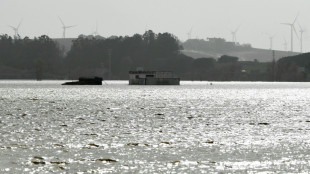
-
 Iran says to hold more talks with US despite Trump military threats
Iran says to hold more talks with US despite Trump military threats
-
Russia accuses Kyiv of gun attack on army general in Moscow

-
 Cambodia reveals damage to UNESCO-listed temple after Thailand clashes
Cambodia reveals damage to UNESCO-listed temple after Thailand clashes
-
Norway crown princess 'deeply regrets' Epstein friendship

-
 Italy set for Winter Olympics opening ceremony as Vonn passes test
Italy set for Winter Olympics opening ceremony as Vonn passes test
-
England's Jacks says players back under-fire skipper Brook '100 percent'

-
 Carrick relishing Frank reunion as Man Utd host Spurs
Carrick relishing Frank reunion as Man Utd host Spurs
-
Farrell keeps the faith in Irish still being at rugby's top table

-
 Meloni, Vance hail 'shared values' amid pre-Olympic protests
Meloni, Vance hail 'shared values' amid pre-Olympic protests
-
Olympic freestyle champion Gremaud says passion for skiing carried her through dark times

-
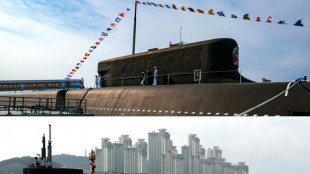 US urges new three-way nuclear deal with Russia and China
US urges new three-way nuclear deal with Russia and China
-
Indonesia landslide death toll rises to 74
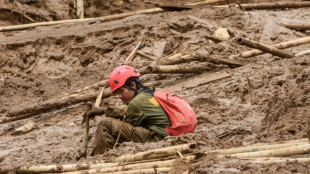
-
 Hemetsberger a 'happy psychopath' after final downhill training
Hemetsberger a 'happy psychopath' after final downhill training
-
Suicide blast at Islamabad mosque kills at least 31, wounds over 130


Myanmar's famed Inle Lake chokes on floating farms
From a gently rocking boat, Nyunt Win tends a floating tomato crop in the cool water of Myanmar's famed Inle Lake, nestled in the Shan Hills and once the country's most popular tourist spot.
The floating farms have become as ubiquitous at the UNESCO-recognised reserve as its famed houses on stilts and leg-rowing fishermen, but locals warn that the plantations are slowly choking the lake.
The ever-expanding farms are eating up surface area, sending chemical runoff into the waters, and clogging the picturesque site with discarded plant matter, opponents say.
Nyunt Win once farmed on dry land near Inle, but he told AFP the "productivity was not great".
Several years ago he bought a share in a floating plantation and now makes 30,000 kyats ($14) per box of tomatoes.
"We're not prosperous but we can rely on this for a living," he said.
But aquaculture comes at a cost to the lake. The farms must be anchored in place and the produce shielded from the sun -- mainly by invasive water hyacinths.
The weed grows rampantly on the surface of Inle, depleting oxygen levels by blotting out light for other plants, so it makes for a free and abundant building block for plantations.
Out on the lake, Si Thu Win heaves mounds of water hyacinths and other aquatic plants from the water to shore up and protect his plants.
"The (tomato) plants do not last long if it's sunny," he says.
"To protect the roots, we have to cover them."
- Clogged shore -
Between 1992 and 2009, the portion of Inle covered by floating farms increased by 500 percent, according to a report from Myanmar's government.
And the area under cultivation has only expanded since then, residents say.
"Mass production" now means the price farmers get for their produce is lower, grumbles Si Thu Win.
The farms do not last forever and when they begin to rot, farmers cut them loose and build new ones, leaving rotting mounds of foliage to clog up the lakeshore.
Floating farms are "ruining" the lake, an official from the Ministry of Agriculture, Livestock and Irrigation told AFP, requesting anonymity.
Local authorities have tried to corral the drifting refuse into designated areas, but they do not have the resources to manage, he said.
"That's why the lake is getting narrower," the official said.
Farmers like Nyunt Win deny they are strangling the lake. They say the bigger problem is that decades of slash-and-burn agriculture on the surrounding hillsides have caused soil to wash into the streams that feed Inle, slowly filling it in.
"When I was young the water would cover the top of a 12-foot bamboo pole," he said.
Now, during the summer months he can "pick up handfuls of soil" from his boat, he said.
The farm boom has pitted tomato cultivators against the fishermen who ply the lake, with 24-year-old Nay Tun Oo alleging that chemical runoff from the crops pollutes the water.
"When I was young and attending school, the water in the lake was not that bad," he told AFP, adding that many species of fish that are good to eat can no longer be found.
A 2017 UN report found "considerable overuse of chemical fertilisers and pesticides" on floating farms, polluting the lake and damaging the surrounding ecosystem.
A new conservation law for Inle was proposed by the regional parliament in 2019 but has not progressed beyond a draft stage.
- Business -
Businesses around the lake also worry that its shrinking surface and environmental degradation will drive tourists away.
"Our Inle lake area was very big when we were young," said Kyaw Kyaw, 38, who owns a jewellery shop on the lake and employs 20 gold- and silversmiths.
"As there are too many floating farms, the water we use for drinking and washing isn't clean anymore."
Inle was once a major tourist destination, drawing around 200,000 foreigners and a million locals a year before the Covid-19 pandemic dented travel.
But there has been no recovery thanks to a military coup in 2021 and clashes between the junta and its opponents across swathes of the country.
Inle Lake lies in the southern part of Shan state, the far north of which has seen fierce fighting over the past two weeks between junta forces and ethnic armed groups.
"It has been three years already... and no foreigners are visiting here," Kyaw Kyaw said.
Some of his metalsmiths are now learning other languages so they can go abroad for work, he said, while others are now working as carpenters.
Si Thu Win said he did not want to leave the lake.
"We are just happy living in Inle," he said.
"We are also worried about the lake disappearing."
D.AbuRida--SF-PST



